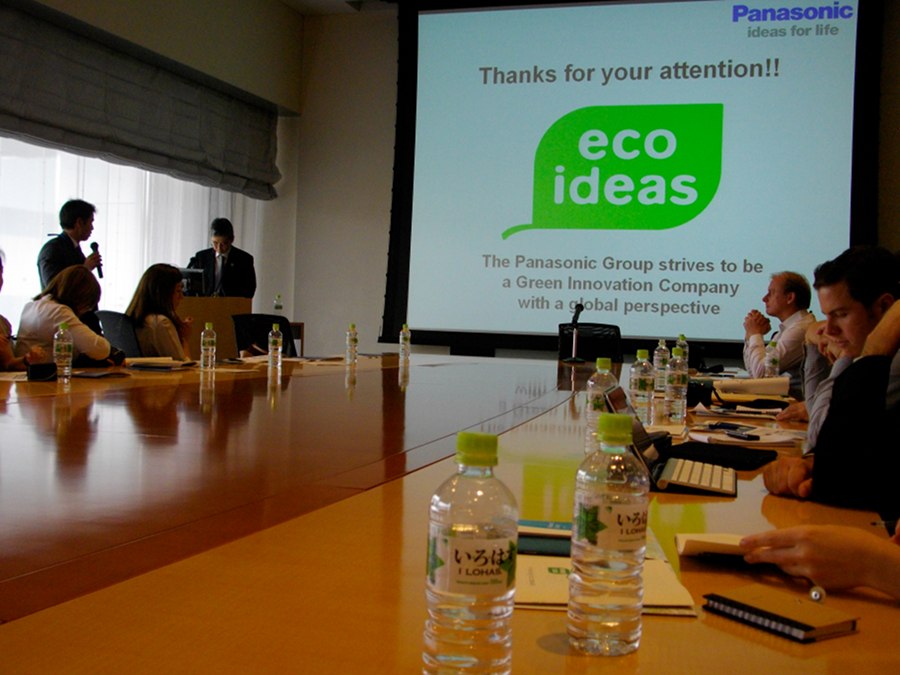November 12, 2011


OSAKA, JAPAN — Panasonic Corporation wants to take over the world, or at least the electronics world. And the global consumer-electronics giant, based in Osaka, has a vision for what that world looks like. The company seeks to provide all the technology for home electronics, appliances, and even electrical vehicles (EVs).
[nggallery id=47 template=carousel images=8][imagebrowser id=47]
Editor’s Note: This story is part of a series looking at Panasonic and its ecological strategies and technological developments.
Story and photos by E.Q. Lam November 12, 2011
OSAKA, JAPAN — Panasonic Corporation wants to take over the world, or at least the electronics world. And the global consumer-electronics giant, based in Osaka, has a vision for what that world looks like. The company seeks to provide all the technology for home electronics, appliances, and even electrical vehicles (EVs).
On Friday, Panasonic wrapped up its week-long eco press tour, highlighting to an international group of media from the United States, Europe, and Asia the company’s present and future developments in electronics. This includes a model home for the future, smart cities projects in several countries, state-of-the-art recycling, and the world’s largest renewable energy facility.
Panasonic president Fumio Ohtsubo announced four years ago that the company would integrate its business activities with environmentalism across the board. Since then, the company has been taking bold steps to make innovative eco ideas central to all of its business operations.
“Our brand slogan—Panasonic, ideas for life—represents such philosophy,” says Katsumi Tomita, manager of corporate environmental affairs at Panasonic, who noted that past innovations have drastically changed people’s lives. Panasonic sees a big turning point with climate change and the lifestyle and development trends around the world. “We are entering into the third phase of revolution, which is the green revolution. … As [Panasonic’s] business grows, the contributions to the planet will be bigger and bigger.”
This eco ideas strategy means comprehensive energy solutions for a green lifestyle and green business—providing all the answers to consumers, businesses, and cities through its products as well as practices.
“Panasonic has basically had a philosophy to live in harmony with the environment for a very long time,” says Peter Fannon, Panasonic’s US vice president of technology policy. “Certainly since the late ‘60s and early ‘70s when things were being expressed even in those terms by our founder, Konosuke Matsushita.”
See more of Fannon’s comments in a one-on-one interview with SCGH:
[youtube]iNxdJe_4jbU[/youtube]
All work within Panasonic is aligned with environmentalism, including the company president and top management, who “now takes very seriously this initiative,” says Tomita. Panasonic employees worldwide now wear the green lapel pin “Eco Ideas.”
In the United States, Panasonic’s US subsidiary plans to move into a LEED-certified building in Newark, New Jersey, just outside New York City, says Jim Reilly, US director of corporate communications for Panasonic. The building will start construction in 2012, but Reilly says that in 2013 the company will move its 1,000 US employees and contractors from the current headquarters in Secaucus, New Jersey, to Newark, where more mass transit is available.
For related articles, see: Novel Japanese Recycling Plant Technology for Smart Homes, Smart Cities Double Energy Savings With DIY Tips and Technology Exclusive Interview With Panasonic Vice President Green Energy Park May Be Answer to Power Supply
Travel and accommodations provided by Panasonic Corporation.
Check out more articles by E.Q. Lam.
© 2011 SCGH, LLC.
]]>